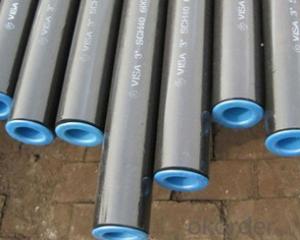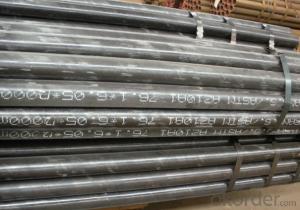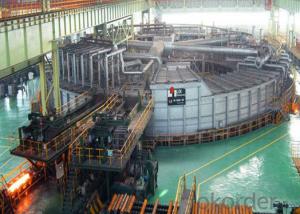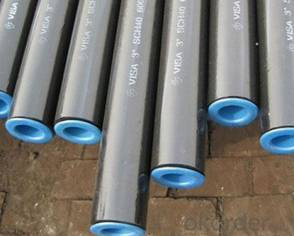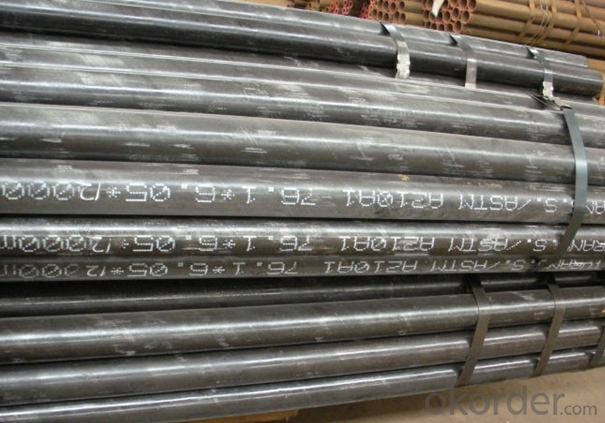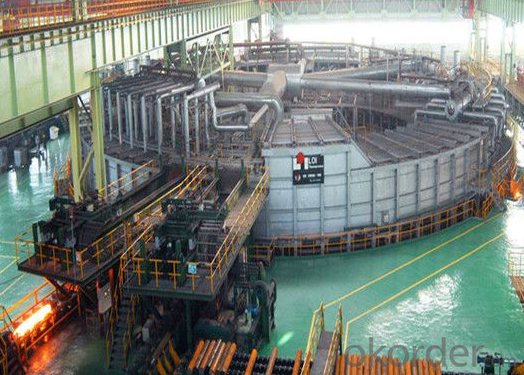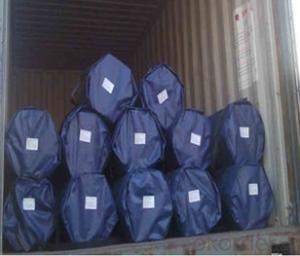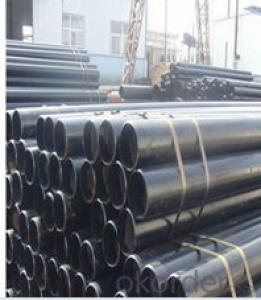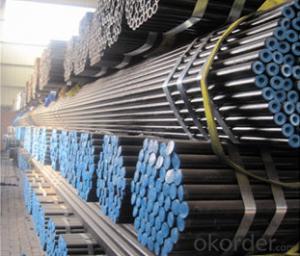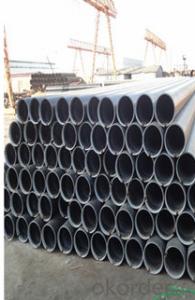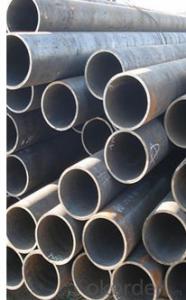High-quality Carbon Seamless Steel Pipe For Boiler CNBM
- Loading Port:
- Qingdao
- Payment Terms:
- TT OR LC
- Min Order Qty:
- 10 pc
- Supply Capability:
- 30 pc/month
OKorder Service Pledge
OKorder Financial Service
You Might Also Like
Quick Details
| Thickness: | 3 - 60 mm | Section Shape: | Round | Outer Diameter: | 21.3 - 1220 mm |
| Secondary Or Not: | Non-secondary | Application: | fluid pipe,boiler pipe, structural pipe, oil/gas/water pipe etc | ||
| Technique: | Hot Rolled | Certification: | ISO9001-2000, ISO14000, ISO18000 , API 5L | Surface Treatment: | Painted, Oiled, galvanized or phosphate etc |
| Special Pipe: | API Pipe | Alloy Or Not: | Is Alloy | Technique:: | Hot rolled or cold rolled |
| Special pipe:: | API/ ASME/thickwall/oil/gas/water pipe | Length:: | 3-12m | Treatment of two ends:: | Beveled end , plain end etc |
| Brand:: | Bai Chuan | Third Party Inspection:: | BV, SGS etc. | Schedule:: | SCH10-SCH160, XS, XXS |
| Other Material:: | 10#, 20#, 16Mn, Q345 etc | Material Type:: | Carbon steel/ Low alloy steel | Producing standard:: | American/Japanese/ German/ Britain/ Chinese standard |
| Grade: | A53(A,B),A106(B,C),A210,API J55,St37,STPG42,A53-A369,API J55-API P110,ST35-ST52 | Standard: | BS EN10296,JIS G3452-2004 |
1. Out Diameter: | 21.3mm-1220mm |
2. Wall Thickness: | 3mm-60mm |
3. Length: | 3m-12m |
4. Producing Standard: |
|
5. Main Material: (Carbon Steel & Low Alloy steel) |
|
6. Special specifications: | Available according to customer’s requirements and quantity. |
7. End Shape: | Beveled end , plain end, varnished, or adding plastic caps to protect the two ends as per customer’s requirements. |
8. Surface treatment: | Painted, Oiled, galvanized, phosphate etc. |
9. Usage: |
|
10. Certificates: | ISO9001-2000, ISO14000, ISO18000, API 5L certificate |
11. Third party inspection: | Welcome you to send a third party inspecting company (BV, SGS etc) to check the quality of our final products. |
12. Pictures: | our producing flow chart, our factory, production line, inspecting equipments, our products are listed below for your reference. |
- Q: Can steel pipes be used for chemical refineries?
- Yes, steel pipes can be used for chemical refineries. Steel pipes are commonly used in chemical industries due to their high strength, durability, and resistance to corrosion. They can withstand high pressure and temperature conditions, making them suitable for transporting various chemicals and fluids within a refinery. Additionally, steel pipes can be easily welded, ensuring a secure and leak-proof system in chemical refineries.
- Q: How are steel pipes used in the manufacturing of HVAC systems?
- Steel pipes are commonly used in the manufacturing of HVAC systems for various purposes. They are used to transport fluids, such as water or refrigerants, throughout the system. Steel pipes are also used for exhaust systems and ventilation, providing a durable and corrosion-resistant solution. Additionally, steel pipes are used in the construction of HVAC equipment, such as heat exchangers and boilers, due to their strength and ability to withstand high temperatures and pressures. Overall, steel pipes play a crucial role in the efficient and reliable functioning of HVAC systems.
- Q: How much is the tube?
- The first prerequisite we need to determine is: what are the specifications of the steel pipe mentioned? Such as the commonly used steel pipe specifications: diameter 108*4.5, diameter 219*6, diameter 377*10, diameter and wall thickness of steel pipe with different specifications, different weight, so the steel price per meter is different.
- Q: What is the thermal conductivity of steel pipes?
- The thermal conductivity of steel pipes can vary depending on the specific type of steel used and its composition. However, on average, the thermal conductivity of steel pipes is around 50-60 watts per meter-kelvin (W/mK). This means that steel pipes are relatively good conductors of heat, allowing for efficient transfer of thermal energy. The high thermal conductivity of steel pipes makes them suitable for various applications, including heating systems, industrial processes, and infrastructure projects where heat transfer is essential.
- Q: Can steel pipes be used for underground cable ducting?
- Yes, steel pipes can be used for underground cable ducting. Steel pipes are commonly used in underground cable ducting due to their strength, durability, and resistance to external factors such as corrosion and impact. They provide reliable protection for cables and are an effective solution for underground cable installations.
- Q: How are steel pipes measured and sized?
- Steel pipes are commonly measured and sized based on their outer diameter (OD) and wall thickness. The OD is measured using a caliper or tape measure, while the wall thickness can be determined by either a micrometer or ultrasonic thickness gauge. This information is crucial for classifying pipes into various standardized sizes, such as schedule or nominal pipe sizes, which are widely used in the industry.
- Q: What are the common standards for coating and lining of steel pipes?
- The most common standards for coating and lining of steel pipes include the American Petroleum Institute (API) standards such as API 5L, API 5CT, and API 5LD. Other widely recognized standards include the American Water Works Association (AWWA) standards such as AWWA C210 and AWWA C213, as well as the National Association of Corrosion Engineers (NACE) standards such as NACE RP0188 and NACE RP0394. These standards ensure the proper selection, application, and performance of coatings and linings to protect steel pipes from corrosion and other external factors.
- Q: What is the role of steel pipes in the transportation of petroleum products?
- Steel pipes have a crucial function in the transportation of petroleum products, as they are specifically designed to endure the high pressure and extreme temperatures associated with oil and gas transportation. A primary responsibility of steel pipes in this process is to serve as a dependable and secure conduit for transporting petroleum products over long distances. They are utilized to construct pipelines that span hundreds or even thousands of miles, connecting oil fields, refineries, and distribution centers. Steel pipes are the preferred choice for this purpose because of their strength, durability, and resistance to corrosion. The high tensile strength of steel allows these pipes to withstand the immense pressure exerted by petroleum products as they flow through the pipelines. Additionally, steel pipes can endure extreme temperatures, ensuring the safe transportation of hot crude oil or refined petroleum products. Moreover, steel pipes possess a high resistance to corrosion, which is of utmost importance given the corrosive nature of petroleum products. To further enhance their corrosion resistance, the pipes are often coated with protective materials such as epoxy or polyethylene. This coating helps prevent leaks or ruptures that could cause environmental damage or safety hazards. Steel pipes also offer cost-effective and efficient transportation of petroleum products. They have a smooth interior surface, which reduces friction and allows for a more efficient flow of oil or gas. This, in turn, helps minimize energy consumption and maximize the throughput of the pipeline system. In conclusion, the main role of steel pipes in the transportation of petroleum products is to provide a reliable, secure, and efficient means of transporting oil and gas over long distances. They are designed to withstand high pressure, extreme temperatures, and corrosion, ensuring the safe and efficient delivery of petroleum products from production sites to refineries and distribution centers.
- Q: Are steel pipes resistant to UV degradation?
- Steel pipes are generally not resistant to UV degradation. Exposure to ultraviolet (UV) radiation over time can cause steel pipes to undergo various forms of degradation. UV radiation can cause the steel to become brittle, leading to cracking and potential failure. Additionally, UV radiation can also cause corrosion and discoloration on the surface of the steel pipes. To mitigate the effects of UV degradation, protective coatings or paint can be applied to the steel pipes to provide a barrier against UV radiation. Regular maintenance and inspections are also necessary to identify any signs of UV degradation and take appropriate measures to prevent further deterioration.
- Q: What is the difference between steel pipes and polyethylene pipes?
- Steel pipes and polyethylene pipes are two types of piping materials that have different characteristics and uses. Steel pipes are made of a durable and strong material, making them suitable for high-pressure applications and transporting fluids or gases. They have a high resistance to heat, corrosion, and impacts, making them ideal for industrial and heavy-duty applications. Steel pipes are commonly used in industries such as oil and gas, construction, and infrastructure projects. Polyethylene pipes, on the other hand, are made of a flexible and lightweight plastic material known as polyethylene. They are commonly used for underground water supply systems, irrigation, and drainage systems. Polyethylene pipes have excellent resistance to chemicals, making them suitable for transporting water and other fluids. They are also more affordable and easier to install compared to steel pipes. In summary, the main difference between steel pipes and polyethylene pipes lies in their material composition, strength, and applications. Steel pipes are stronger and suitable for high-pressure applications, while polyethylene pipes are flexible, lightweight, and commonly used for water supply and drainage systems.
Send your message to us
High-quality Carbon Seamless Steel Pipe For Boiler CNBM
- Loading Port:
- Qingdao
- Payment Terms:
- TT OR LC
- Min Order Qty:
- 10 pc
- Supply Capability:
- 30 pc/month
OKorder Service Pledge
OKorder Financial Service
Similar products
Hot products
Hot Searches
Related keywords
